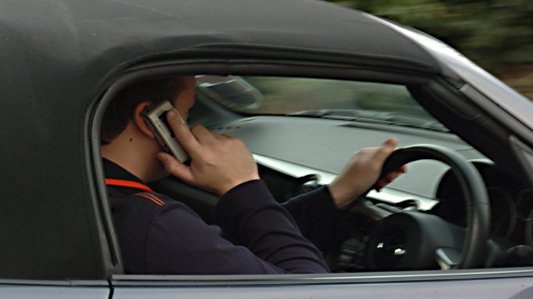Research published this week by the RAC shows that more people are using a mobile phone while they’re driving even though it is illegal.
The number of accidents as a result is growing – many of them fatal. The government is planning to increase the penalties for those caught doing it but critics say the new penalties will be nowhere near tough enough to get people to change their habits. So how tough should we get?
The RAC’s report is based on both data and interviews with a sample of 1,714 drivers. The survey showed that almost four times as many people now admit to using their mobiles while driving compared with two years ago: 8% in 2014 and 31% now. The numbers saying they texted or sent messages on social media have risen over the same period from 7% to 19%. In addition, 14% of drivers said they took photos or even made videos on their mobiles while behind the wheel.
Using a hand-held mobile while driving was made illegal in 2003. Since then, of course, the number of people using mobiles has increased enormously: almost no one goes without one now. So the ubiquity of mobiles may in part explain the increase in the numbers of those admitting to using them while driving, but it also seems to be the case that more people think it OK to do so or that they won’t get caught if they do.
Meanwhile it becomes no less dangerous an activity. Research has shown that the reaction time of drivers slows by about 37% when they are using a mobile to send a text. Using a mobile as a phone produces a similar impairment of attention, and research has shown too that non-hand-held mobiles are just as distracting of a driver’s attention as hand-held phones.
Department of Transport statistics indicate that the use of mobiles as a contributory factor to driving accidents increased by 40% between 2010 and 2014. In that most recent year for which figures are available, the use of mobiles as contributory factor occurred in 492 driving accidents, 84 of them serious and 21 fatal. Around 200 people have been killed in the last ten years as a result of accidents involving drivers using mobiles.
Current penalties for using a mobile while driving involve an automatic fixed penalty notice, three points on the licence and a fine of £100. Such a punishment is equivalent to not paying a TV licence, failing to tell the DVLA you have sold your car or taking your kids on holiday in term time without permission, even though the potential for causing harm by using a mobile while driving is obviously so much greater. It’s true that drivers who do cause accidents by using their mobiles can be prosecuted for dangerous driving and so incur much greater penalties - indeed one such driver was sent to prison for nine years recently - but campaigners argue that the penalties for simply using a mobile even when no accident occurs should be stronger simply to deter people from doing it.
The government seems to agree that current penalties are inadequate but it is expected to tighten them only to the extent of imposing four penalty points and increasing the fine to £150. Its critics say this is wholly inadequate. The road safety charity, Brake, demands minimum fines of £500 and the imposition of 6 penalty points, meaning that any driver caught doing it twice would risk losing his licence.
But the chances of not being caught may be one of the reasons why more people seem willing to take the risk. Prosecutions for using a mobile while driving stood at 32,500 in 2009 but fell to 17,414 five years later. Part of the reason for that may be the drop in the number of full-time dedicated road policing officers. In England and Wales (excluding London) there was a fall of 27% in the number of these officers between 2010 and 2015 as a result of cuts in police funding.
The authors of the RAC report say that drivers using mobiles is now ‘the biggest road safety concern among motorists today’. So how should we get people to change their behaviour?
Campaigners look back to the era when drink-driving was acceptable and few people bothered to use their seat belts. Getting those attitudes changed required what Paul Jordan of advertising agency McGarryBowen called ‘twenty years of concerted advertising’. That is what many campaigners think the government needs to engage in now. Mr Jordan wants ‘a really hard-hitting campaign to jolt people out of their complacency’ but acknowledges that it could well take as long to make using a mobile while driving as socially taboo as drink-driving has become.
What else needs doing? Some argue the law itself needs to be tightened to ban the use of non-hand-held mobiles since they are just as dangerous. But that would mean car manufacturers having to redesign their cars so that the phones can no longer be used in new vehicles.
What’s your view? Do you yourself use a mobile while you’re driving? If so, is it because you don’t believe that it’s dangerous or because you don’t think you’ll be caught? Or that you think the penalties are trivial? Whether you use a mobile while driving or not, do you think most people are unaware of how dangerous it can be or perhaps think that the impairment of attention doesn’t apply to them? Should the use of non-hand-held mobiles be made illegal too? Should the penalties for drivers using mobiles be increased and, if so, by how much? Should more police resources be put into road policing? And should the government start an advertising campaign along the lines of the one that persuaded us to stop drinking and driving?









